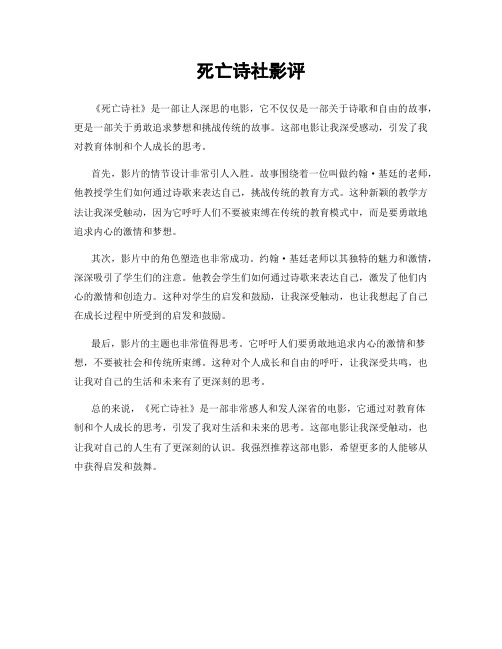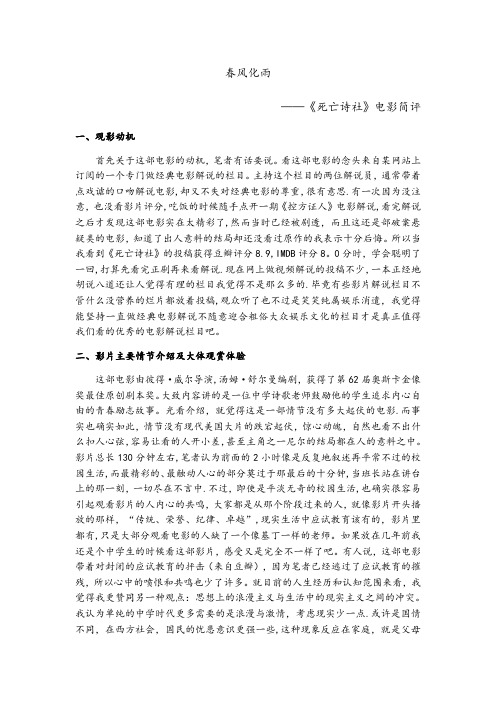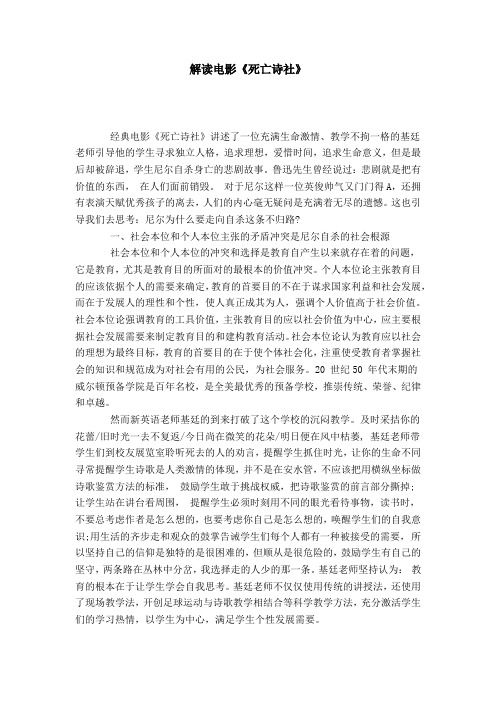影视作品鉴赏--死亡诗社人物分析
死亡诗社影评

死亡诗社影评
《死亡诗社》是一部让人深思的电影,它不仅仅是一部关于诗歌和自由的故事,更是一部关于勇敢追求梦想和挑战传统的故事。
这部电影让我深受感动,引发了我对教育体制和个人成长的思考。
首先,影片的情节设计非常引人入胜。
故事围绕着一位叫做约翰·基廷的老师,他教授学生们如何通过诗歌来表达自己,挑战传统的教育方式。
这种新颖的教学方法让我深受触动,因为它呼吁人们不要被束缚在传统的教育模式中,而是要勇敢地追求内心的激情和梦想。
其次,影片中的角色塑造也非常成功。
约翰·基廷老师以其独特的魅力和激情,深深吸引了学生们的注意。
他教会学生们如何通过诗歌来表达自己,激发了他们内心的激情和创造力。
这种对学生的启发和鼓励,让我深受触动,也让我想起了自己在成长过程中所受到的启发和鼓励。
最后,影片的主题也非常值得思考。
它呼吁人们要勇敢地追求内心的激情和梦想,不要被社会和传统所束缚。
这种对个人成长和自由的呼吁,让我深受共鸣,也让我对自己的生活和未来有了更深刻的思考。
总的来说,《死亡诗社》是一部非常感人和发人深省的电影,它通过对教育体
制和个人成长的思考,引发了我对生活和未来的思考。
这部电影让我深受触动,也让我对自己的人生有了更深刻的认识。
我强烈推荐这部电影,希望更多的人能够从中获得启发和鼓舞。
《死亡诗社》影评

《死亡诗社》影评《死亡诗社》是一部令人难以忘怀的电影,它在我心中留下了深深的共鸣。
这部电影以其独特的故事情节和精彩的演技,让我深深感受到了对自由思考和追求激情的重要性。
首先,电影通过讲述一位非传统教师约翰·基廷斯(由罗宾·威廉斯饰演)的故事,向观众展示了一种不同寻常的教育方式。
约翰·基廷斯鼓励学生们独立思考,追求自己内心真正的激情和梦想。
他以其独特的方式激发了学生们对诗歌和艺术的热情,使他们从传统的学术压力和家庭期望中解放出来。
这种教育方式让我深深感动,也让我反思了现实教育体系中的问题。
其次,电影中的主题“死亡诗社”表达了对生命的热爱和珍惜。
学生们在这个秘密的俱乐部中,通过朗诵诗歌来表达自己的情感和思考。
他们用诗歌来传达对生活的热爱,对自由的渴望,以及对死亡的理解。
这种对生命的热爱和珍惜,让我深深感受到了人生的意义和价值。
此外,电影中的演员们表现出色,特别是罗宾·威廉斯的精彩演出。
他将约翰·基廷斯这一角色演绎得栩栩如生,充满了魅力和智慧。
他的表演让我深深感受到了约翰·基廷斯的激情和对学生的关怀。
其他演员们也都表现出色,他们的演技让人印象深刻。
最后,电影的音乐和摄影也给我留下了深刻的印象。
音乐的运用让整个故事更加动人,摄影的精美画面给人一种梦幻般的感觉。
这些元素让电影更加生动而美丽,也增加了观众的情感共鸣。
总的来说,《死亡诗社》是一部令人难以忘怀的电影。
它通过独特的故事情节和精彩的演技,让我深深感受到了对自由思考和追求激情的重要性。
这部电影让我反思了现实教育体系中的问题,也让我更加珍惜生命的意义和价值。
我强烈推荐观看这部电影,相信它会给你带来深深的感动和共鸣。
《死亡诗社》影评

春风化雨——《死亡诗社》电影简评一、观影动机首先关于这部电影的动机,笔者有话要说。
看这部电影的念头来自某网站上订阅的一个专门做经典电影解说的栏目。
主持这个栏目的两位解说员,通常带着点戏谑的口吻解说电影,却又不失对经典电影的尊重,很有意思.有一次因为没注意,也没看影片评分,吃饭的时候随手点开一期《控方证人》电影解说,看完解说之后才发现这部电影实在太精彩了,然而当时已经被剧透,而且这还是部破案悬疑类的电影,知道了出人意料的结局却还没看过原作的我表示十分后悔。
所以当我看到《死亡诗社》的投稿获得豆瓣评分8.9,IMDB评分8。
0分时,学会聪明了一回,打算先看完正剧再来看解说.现在网上做视频解说的投稿不少,一本正经地胡说八道还让人觉得有理的栏目我觉得不是那么多的.毕竟有些影片解说栏目不管什么没营养的烂片都放着投稿,观众听了也不过是笑笑纯属娱乐消遣,我觉得能坚持一直做经典电影解说不随意迎合粗俗大众娱乐文化的栏目才是真正值得我们看的优秀的电影解说栏目吧。
二、影片主要情节介绍及大体观赏体验这部电影由彼得·威尔导演,汤姆·舒尔曼编剧,获得了第62届奥斯卡金像奖最佳原创剧本奖。
大致内容讲的是一位中学诗歌老师鼓励他的学生追求内心自由的青春励志故事。
光看介绍,就觉得这是一部情节没有多大起伏的电影.而事实也确实如此,情节没有现代美国大片的跌宕起伏,惊心动魄,自然也看不出什么扣人心弦,容易让看的人开小差,甚至主角之一尼尔的结局都在人的意料之中。
影片总长130分钟左右,笔者认为前面的2小时像是反复地叙述再平常不过的校园生活,而最精彩的、最触动人心的部分莫过于那最后的十分钟,当班长站在讲台上的那一刻,一切尽在不言中.不过,即使是平淡无奇的校园生活,也确实很容易引起观看影片的人内心的共鸣,大家都是从那个阶段过来的人,就像影片开头播放的那样,“传统、荣誉、纪律、卓越”,现实生活中应试教育该有的,影片里都有,只是大部分观看电影的人缺了一个像基丁一样的老师。
分析影片《死亡诗社》主要人物与其对教育的启示

分析影片《死亡诗社》主要人物与其对教育的启示作者:董瑜慧来源:《速读·下旬》2018年第10期一、引言电影讲述一位名叫基廷的教师在一所比较传统的学校用不同的教育方法教授学生,他鼓励学生们释放自己的思想,体会诗歌的优美和生活的意义。
影片还描绘了不同性格的学生们的成长,本文着重分析其中的人物并分析其对教育的启示。
二、电影解析1.从教师的角度——思想解放者与封建应试教育学校的矛盾影片中基廷的到来给这所守旧的学校带来了新鲜的血液。
基廷先生一出场就是吹着口哨带领学生走出教室,在历届学生的展厅上课。
这是基廷给大家上的第一节启蒙课程。
他首先让皮兹读了一首诗句:“花开堪折直须折,时光易逝,今日轻绽浅笑的花朵,明日便将凋零。
”他说因为我们都会死去,成为虫子的食物,所以要“及时行乐”。
“哦,船长,我的船长!”他让学生们喊他船长,正是因为他相信,他可以带领大家,让他们成为世界的水手,游遍所有的港口,解放身体和心灵。
他让学生把书的导论部分撕掉,是因为他觉得诗是不能够被任何东西衡量的,他说:“我们读诗、写诗并不是因为它们好玩,而是因为我们是人类的一分子,而人类是充满激情的。
没错,医学、法律、商业、工程,这些都是崇高的追求,足以支撑人的一生。
但诗歌、美丽、浪漫、爱情,这些才是我们活着的意义。
”他让学生们站在桌子上去,告诉他们用不同的角度去看事情,然后要努力找到自己的声音,不能一味只轻信别人——要用批判性的思维去思考问题。
基廷所做一切都与传统的教育背道而驰,他帮助学生解开传统的思想禁锢,发现自我,重新认识自己。
2.从学生的角度——内心渴望自由和传统外界禁锢的冲突这部影片主要描写了几个学生——尼尔、陶德、查理和卡梅隆。
尼尔是热烈的浪漫主义者,他内心清楚知道自己想要做什么,他说自从他有记忆起就想要做表演。
尼尔非常出众,他的成绩名列前茅,他始终是班级里最有力量的那个人,领导着大家去打破传统的思想禁锢,带领大家建立死亡诗社,和大家在山洞里探讨人生,帮助陶德释放自己,寻找自己心底真正的声音。
解读电影《死亡诗社》

解读电影《死亡诗社》经典电影《死亡诗社》讲述了一位充满生命激情、教学不拘一格的基廷老师引导他的学生寻求独立人格,追求理想,爱惜时间,追求生命意义,但是最后却被辞退,学生尼尔自杀身亡的悲剧故事。
鲁迅先生曾经说过:悲剧就是把有价值的东西,在人们面前销毁。
对于尼尔这样一位英俊帅气又门门得A,还拥有表演天赋优秀孩子的离去,人们的内心毫无疑问是充满着无尽的遗憾。
这也引导我们去思考:尼尔为什么要走向自杀这条不归路?一、社会本位和个人本位主张的矛盾冲突是尼尔自杀的社会根源社会本位和个人本位的冲突和选择是教育自产生以来就存在着的问题,它是教育,尤其是教育目的所面对的最根本的价值冲突。
个人本位论主张教育目的应该依据个人的需要来确定,教育的首要目的不在于谋求国家利益和社会发展,而在于发展人的理性和个性,使人真正成其为人,强调个人价值高于社会价值。
社会本位论强调教育的工具价值,主张教育目的应以社会价值为中心,应主要根据社会发展需要来制定教育目的和建构教育活动。
社会本位论认为教育应以社会的理想为最终目标,教育的首要目的在于使个体社会化,注重使受教育者掌握社会的知识和规范成为对社会有用的公民,为社会服务。
20 世纪50 年代末期的威尔顿预备学院是百年名校,是全美最优秀的预备学校,推崇传统、荣誉、纪律和卓越。
然而新英语老师基廷的到来打破了这个学校的沉闷教学。
及时采拮你的花蕾/旧时光一去不复返/今日尚在微笑的花朵/明日便在风中枯萎, 基廷老师带学生们到校友展览室聆听死去的人的劝言,提醒学生抓住时光,让你的生命不同寻常提醒学生诗歌是人类激情的体现,并不是在安水管,不应该把用横纵坐标做诗歌鉴赏方法的标准,鼓励学生敢于挑战权威,把诗歌鉴赏的前言部分撕掉;让学生站在讲台看周围,提醒学生必须时刻用不同的眼光看待事物,读书时,不要总考虑作者是怎么想的,也要考虑你自己是怎么想的,唤醒学生们的自我意识;用生活的齐步走和观众的鼓掌告诫学生们每个人都有一种被接受的需要,所以坚持自己的信仰是独特的是很困难的,但顺从是很危险的,鼓励学生有自己的坚守,两条路在丛林中分岔,我选择走的人少的那一条。
对小说《死亡诗社》中尼尔悲剧的原因分析

AbstractAmerican classic novel Dead Poets Society mainly tells the story of the teacher and a group of young students with a personal independence of conduct of the story. The writer shows some contradictions and conflicts between the school and the students, parents and students, teachers and students with unadorned style.This is a part of life and freedom, and the traditional related educational novel, also is a classical literature which questions and challenges the traditional teaching, is a symbol of youth andvitality, is the freshness of the deep spring of life.The novel describes the process in detail that Neil fights againstwith the school, the parents and the tradition in order to pursueideal and freedom. However the ideal is good, the reality is cruel, Neil fails to revolt and ends with suicide. The tragedy of Neil reflects from one aspect the influence of school education and family education on teenagers.The paper consists of the five parts: The first part gives a general idea of the novel Dead Poets Society. The second part describes the tragedy of Neil and its embodiments in the novel. The third part discusses the causes of the tragedy of Neil in the novel. The fourth part states Neil’s tragedy in the novel to the enlightenment of current education in our country. The last part is the conclusion of the paper.Key Words: education; freedom; Neil; tragedy摘要美国经典小说《死亡诗社》主要讲述了一个特立独行的老师和一群年轻学生的故事。
电影《死亡诗社》中Neil Perry的人物分析
Neil’s character always remains static – meaning he does not undergo a change in his character at any time during the movie. Just because he died at the end does not mean that he changed.His life was an act –to his father, to Keating, even to himself, b ut when he wasn’t acting, he thought he had nothing to contribute – he was just as lost as Todd was when Todd first came to Welton. Neil couldn’t deal with the idea that to give up acting was to quit playing the roles that he lived everyday, and so he kill ed himself because he “realized that he had not lived” up to that point. He just took on a different role to fit the circumstance. He never was upfront and honest about his passions to anyone. Neil wanted to be someone else – a person who could express his passions when the time was appropriate. Symbolism:Neil seems to symbolize his kneeling down before everyone – such as his father (who takes away all control Neil tries to have – such as the editor of the newspaper) and the school. Perry seems to be sym bolic for “perish” and death, foreshadowing Neil’s suicide later in the movie. I think that’s why Todd and Neil got along so well. (On the first day of Keating’s class, Keating states that they are all going to die. Neil looks incredibly disturbed while considering this.) Neil could control Todd, and that was the only thing in his life he felt he had control over. Also, in a way, I think Neil saw himself in Todd, because Neil acted towards his father the way Todd acted towards everyone. By trying to help Todd, he thought maybe he could help himself. Neil claims, “the meek might inherit the earth, but they don’t make it into Harvard,” and he’s right –he’s meek, and he never makes it into Harvard.He is the first to ask what the Dead Poets Society was. He is also the one to organize the first meeting. Neil also tells Todd that he must participate in the club.Neil’s PoemsThese lines and his Madman Story not only explain Neil’s philosophy but foreshadow what is about to come – his destruction.“I went to the woods because I wanted to live deliberately. I wanted to live deep and suck out all the marrow of life. To put to rout all that was not life, and not when I had come to die, discover that I had not lived.” – from Walden“Come, my friends, ‘T is not too la te to seek a newer world.For my purpose holds To sail beyond the sunset, and tho’ We are not now that strength which in old days Moved earth and heaven, that which we are, we are; One equal temper of heroic hearts, Made weak by time and fate, but strong i n will To strive, to seek, to find, and not to yield.” – from Ulysses“It was a dark and rainy night. And this old lady who had a passion for jigsaw puzzlessat by herself in her house at her table to complete a new jigsaw puzzle. As she piecedthe puzzle together, she realized to her astonishment that the image that was formed washer very own room, and the figure in the center of the puzzle, as she completed it, washerself. And with trembling hands she placed the last four pieces and stared in horror atthe face of the demented madman at the window. The last thing that this old lady everheard was the sound of breaking glass.”In the end, Neil realized that it was his own life and he was in the center of it. Since his dad had control over him and he was too afraid to stand up to him.Midsummer Night’s DreamWhen Neil learns about the play, he is filled with his passions. He claims that this is the first time in his life that he knows what he wants to do, even if his father disapproves. When Todd mentions this, he asks, “Can’t I just enjoy the idea for a while?” This is the beginning of his loss of control to his passions.As the role of Puck, Neil is able to express what he could not when he wasn’t acting. The Puck epilogue is said directly to his father, in hopes that his father will forgive him. He cannot say anything later when his father tells him what he expects Neil to do because at that moment he is no longer acting.SuicideFinally, in his room, he realizes that the last four pieces of the puzzle of his life have been put into place, and that his only option in order to gain some control of his life is to take his own life. Neil was his father’s dream. When his father woke up, his dream was gone.Neil, His Father, and the SuicideNeil’s relati onship with his father is a case of misunderstanding and lack of communication. Mr. Perry wanted what was best for his son, which led to extremely high expectations. Neil wanted to find out who he was and what he wanted to do. Neil was unable to discuss his opinions and options with his father, and Mr. Perry was unwilling to look at Neil’s outlook on life. This cyclical pattern led Neil to conclude that suicide was the only way to gain control of his life and stand up to his father.There is no evidence that Neil thought about suicide up until that night. It appears to be a spontaneous decision made on the basis of the hopelessness he felt that night. Maybe it was an act to break free from his father’s control, but in trying to gain that control over his l ife, he sacrificed everything to escape.Mr. Perry was at traditionalist, which unfortunately meant he had a difficult time expressing affectionate emotions. He also had a large number of expectations because like any parent, he ultimately wanted the best for his son, a 16-17 year old with a bright future ahead of him. Unfortunately, Neil never really saw or understood that his father only wanted what was best for Neil. He only saw the tyrant-like authority figure who constantly demanded that Neil achieve greatness in academia and who obeyed him unquestioningly.Neil, however, did question that role – to himself, to others, even to Keating. Unfortunately, he never truly was able to convey that to his father. The only time he was able to stand up to his father was in the role of Puck during the play, when he asked for forgiveness with his last soliloquy, an act which deliberately disobeyed and thus enraged his father. He had many opportunities to do so before then, but he never seized the opportunity to reestablish a connection. The father and son were like strangers, each with a specific perception of the other, but neither really knew who the other was. This perpetuated the cycle of misunderstandings between the two and eventually played a major role in Ne il’s suicide.In Mr. Perry’s perspective, Neil was a model child who was focused on getting into a good college. He then learns from another parent that Neil was going to be in the play. This was the first he had heard of this, as Neil had lied to everyo ne about his father’s approval. Mr. Perry then told Neil that couldn’t be involved, an order Neil deliberately disobeyed by performing in the opening show the following night. When Mr. Perry saw Neil as Puck, he became furious and probably overreacted a bit by concluding thatit must be the school (or more specifically, Mr Keating – the new teacher) that was the cause of this and that Neil should transfer schools to regain his focus.Neil, on the other hand, wanted to know who he was. He was always obedien t to his father’s wishes, but he wanted to know more about himself. Acting was something he could do for himself – something that he enjoyed and allowed him to explore what he was able to accomplish. On the other hand, it was also a means of escaping his current reality by being someone else for a few hours. Keating suggested Neil talk to his father about this passion, but Neil second guessed his father’s actions by arguing that his father would never understand. He never gave his father the benefit of the doubt and tried to explain. Keating even went so far as to tell Neil that even if his father didn’t see things his way, he’d soon be out of school and could do what he wished then. Neil wouldn’t listen to this advice, and later when Keating asked if Neil had spoken to his father, Neil said he did consent.Yes, Mr. Perry was hard on Neil, but that was probably out of concern. He was paying a lot of money to attend a great school to prepare him for an ivy league school, and Neil, out of nowhere, decides he d oesn’t want to go to college. He wants to act. Mr. Perry believed that this was a fleeting dream, and that if Neil followed this path, he would be throwing away a wonderful opportunity for a pursuit that would last a couple of years. After all, most people don’t really have a grasp on their future until at least their junior or senior year of college. If his acting career failed, which in all likelihood, it would have, Neil would have no skills to fall back on.Also, Neil never really stood up to his father. There were times he tried, like when Mr. Perry told Neil he should drop some extracurricular activities, but he did so in the presence of others, which created a hostile environment between the two. It would have been interesting if Neil and his father would have actually sat down and chatted about what Neil wanted and what they could do to compromise. Even at the very end, when the two confronted each other right before Neil committed suicide, Neil still could not face his father. Mr. Perry specifically asked Neil what he wanted, and Neil couldn’t answer him. I think Mr. Perry really expected Neil to give him an answer, and I think if Neil would have, his father may have been more understanding.In a way, Neil resembles how Todd was in the beginning of the movie. Todd couldn’t speak to anyone of authority without sounding insecure. In one of the extra scenes, Todd tried to ask for rowing instead of soccer, but could barely speak. He was given soccer instead. Also, in class, whenever he was asked a quest ion, he couldn’t answer. He wanted to say something – especially to recite the poem he spent so much time writing, but he never could. He even ended up ripping up his poem.Who is Responsible for the Suicide?In the end, both the realists and the romantic s blame the other for Neil’s suicide. The romantics say it was Neil’s father. Even Todd says this when he first confronts his romanticism in the snow. The realists say it was Keating, and in the end, force Keating to leave. Neither side wants to believe that through the act of suicide, Neil is taking control of his own life decisions and therefore must assume the responsibility.Suicide is a personal choice, and only Neil could decide whether or not to commit the act. There is a point in everyone’s life wh ere they feel that no one understand them, and no matter what they say, itdoesn’t change the situation. However, by Neil killing himself, Mr. Perry never had the opportunity to understand his son’s desires and passions.。
电影死亡诗社人物分析
Character Analysis
John Keating
—O Captain!My Captain!
The image of Keating:
Unconventional , imaginative, passionate, amiable, knowledgeable, idealistic
When Neil organized the death poet’s society, he was the scarest one.
At last, he betrayed others to save himself when questioned by the principle about the dead poets society.
in the eyes of the school leaders, I’m a “good” student.
The ideal was beated by the reality, and the captain was expeled.
Although Mr.Keating was fired by the school in the end, what he taught to the students has been remembered by those youCameron
——the Disgusting Rat
The image of Richard: Traditional conformist selfish …
After Mr.Keating’s first class,he only concerned about if Mr.Keating will test them about those stuff.
影视作品鉴赏--死亡诗社人物分析
影视作品鉴赏--死亡诗社人物分析托德·安德森安德森在影片大部分的时间都是非常沉默的,长相也很普通,在众多的学生当中很难辨认(我也是花了很长时间才把他从众多的学生当中区分开来),属于威尔顿学院中非常典型的学生,刻苦,平庸。
然而他的改变也是最大、最让人感到欣慰的,这是对威尔顿学院模式化教学的一种反抗,也是一种反思。
安德森从一开始转来威尔顿学院就被赋予厚望。
他一直低着头,有时甚至有点不知所措,表明他没什么自信。
校长告诉他,他的哥哥曾是这个学校最优秀的学生之一,因此他也承受了很大的压力。
他一开始给人的印象是“像个木瓜一样”。
而事实确实如此。
沉默寡言,与周围的同学似乎有点气场不和。
室友和同学们相互嬉笑聊天的时候,他还是一个人默默地整理东西,背对着镜头,以至于他们好像都把安德森给忘记了,他们讨论了一会儿才忽然想起来要做一下自我介绍,而且是由室友尼尔来告诉他的同学们“这是托德。
安德森”。
而同时安德森的哥哥这个著名的优秀生又一次被提及,可以看出安德森的内心是非常不爽的。
可是他依然还是沉默。
同学们热情的邀请安德森一起参加读书小组,他也是只说了一句“谢谢”,并且专心的在对表,这也可以看出他个性中的严谨、小心、认真,他决定要努力学习,也许是想尽量的缩小和传说中的哥哥之间的距离。
事实上,安德森确实是非常努力地在学习,甚至有时候有些古板。
在澡堂里,大家都热热闹闹的在洗澡,而他一个人穿着衣服坐在窗台上,也不跟别人交流,不知道他不洗澡来澡堂干什么,可能是默默地洗完了然后等人,说明安德森其实还是蛮单纯善良的。
尼尔问他要不要晚上参加学习小组,而他的却因为要做历史作业而拒绝掉了,太可惜了,学习小组也是学习,做作业也是学习,难道是觉得学生自己组织的学习小组不是学习,说明他的古板。
而安德森的古板和保守让他在基廷老师的文学课上吃了苦头。
他是那种一板一眼跟着老师走的小朋友,老师说什么都当成圣旨一样的去执行,老师在黑板上写什么更加是完完全全一摸一样的抄下来,没什么自己的想法。
死亡诗社 影评
死亡诗社影评
《死亡诗社》是一部让人心潮澎湃的电影,它深深触动了我内心深处的情感。
故事发生在一个传统的寄宿学校里,一位充满激情和创造力的英文老师约翰·基廷(由罗宾·威廉斯饰演)激发了学生们对诗歌和自由思想的热爱。
这部电影通过对抗传统教育观念和追求个人内心真实的故事,让我深刻思考了教育的本质和个人成长的重要性。
影片中,约翰·基廷老师用他非传统的教学方法激发了学生们对诗歌的兴趣和热爱,他鼓励他们追求自己内心的激情和真实,而不是被束缚在传统的教育框架里。
这种对抗传统的精神让我深受触动,也让我思考了教育应该是如何去引导学生去追求内心的真实和激情,而不是简单地灌输知识和技能。
此外,影片中的学生们也给我留下了深刻的印象。
他们每个人都有自己的独特性格和内心的挣扎,但在约翰·基廷老师的激励下,他们逐渐找到了自己的声音和梦想。
这让我深深感受到了个人成长和自我实现的重要性,也让我思考了在成长过程中,我们应该如何去坚持自己内心的信念和追求自己的梦想。
最后,影片的结局让我感到非常震撼和悲伤。
约翰·基廷老师
在面对学校和家长的压力下,选择了为了学生们的梦想而牺牲自己。
这种对于理想和信念的坚持,让我深受触动,也让我思考了在现实生活中,我们应该如何去追求自己的理想和坚持自己内心的信念。
总的来说,《死亡诗社》是一部让人深受触动的电影,它让我思考了教育的本质、个人成长的重要性以及对于理想和信念的坚持。
这部电影不仅仅是一部催人泪下的作品,更是一部让人深刻思考的心灵之作。
我强烈推荐这部电影,希望更多的人能够从中获得启发和共鸣。
- 1、下载文档前请自行甄别文档内容的完整性,平台不提供额外的编辑、内容补充、找答案等附加服务。
- 2、"仅部分预览"的文档,不可在线预览部分如存在完整性等问题,可反馈申请退款(可完整预览的文档不适用该条件!)。
- 3、如文档侵犯您的权益,请联系客服反馈,我们会尽快为您处理(人工客服工作时间:9:00-18:30)。
影视作品鉴赏--死亡诗社人物分析
托德·安德森
安德森在影片大部分的时间都是非常沉默的,长相也很普通,在众多的学生当中很难辨认(我也是花了很长时间才把他从众多的学生当中区分开来),属于威尔顿学院中非常典型的学生,刻苦,平庸。
然而他的改变也是最大、最让人感到欣慰的,这是对威尔顿学院模式化教学的一种反抗,也是一种反思。
安德森从一开始转来威尔顿学院就被赋予厚望。
他一直低着头,有时甚至有点不知所措,表明他没什么自信。
校长告诉他,他的哥哥曾是这个学校最优秀的学生之一,因此他也承受了很大的压力。
他一开始给人的印象是“像个木瓜一样”。
而事实确实如此。
沉默寡言,与周围的同学似乎有点气场不和。
室友和同学们相互嬉笑聊天的时候,他还是一个人默默地整理东西,背对着镜头,以至于他们好像都把安德森给忘记了,他们讨论了一会儿才忽然想起来要做一下自我介绍,而且是由室友尼尔来告诉他的同学们“这是托德。
安德森”。
而同时安德森的哥哥这个著名的优秀生又一次被提及,可以看出安德森的内心是非常不爽的。
可是他依然还是沉默。
同学们热情的邀请安德森一起参加读书小组,他也是只说了一句“谢谢”,并且专心的在对表,这也可以看出他个性中的严谨、小心、认真,他决定要努力学习,也许是想尽量的缩小和传说中的哥哥之间的距离。
事实上,安德森确实是非常努力地在学习,甚至有时候有些古板。
在澡堂里,大家都热热闹闹的在洗澡,而他一个人穿着衣服坐在窗台上,也不跟别人交流,不知道他不洗澡来澡堂干什么,可能是默默地洗完了然后等人,说明安德森其实还是蛮单纯善良的。
尼尔问他要不要晚上参加学习小组,而他的却因为要做历史作业而拒绝掉了,太可惜了,学习小组也是学习,做作业也是学习,难道是觉得学生自己组织的学习小组不是学习,说明他的古板。
而安德森的古板和保守让他在基廷老师的文学课上吃了苦头。
他是那种一板一眼跟着老师走的小朋友,老师说什么都当成圣旨一样的去执行,老师在黑板上写什么更加是完完全全一摸一样的抄下来,没什么自己的想法。
但是,这一回,却被基廷老师给耍了。
因为基廷老师碰巧是那种有创意,有突破,有想法,不按常理出牌的难得一见的老师(特别是在这样一个传统的学校里),也许是因为基廷曾在这个学校学习过,深刻的理解到模式化教学对这些人生观、世界观、价值观正在慢慢发展的年轻学生们是相当大的摧残,因此希望尽量的改变那些像安德森这样的学生。
安德森非常认真的把基廷胡乱画在黑板上的图复制到一本巨大的笔记本上(看来他是非常希望上好这个课的,可是他预计错了),然后就听到基廷说“屁话”,于是安德森只好非常无辜的把那一页给划掉了。
可是接下来基廷又让同学们撕书,这让安德森感到很为难,但是还是随大流。
最后基廷说“因为伟大的戏剧在继续,因为你可以奉献一首诗”,这无疑是安德森多年学习以来
听到的最独特的对诗的解释,基廷问了一个问题“你的诗在哪里”,最后给了安德森一个特写镜头,看出这让安德森心里产生了小小的涟漪。
安德森好像对诗有一种恐惧。
尼尔兴致勃勃的组织着死亡诗社,但是安德森并不想参加,他不想念诗,大概是他觉得自己作诗不好,不好意思在大家面前朗读,这又说明了他自信心的缺乏。
可以看到他一直都是一个人默默的坐在位置上,也不参与大家的讨论,只看见同桌尼尔跑来跑去,这也是一种对比吧。
但是他最终还是参加了,说明他的改变是一点一点发生的,很微妙。
又一次基廷老师的课,这一次,老师要他们站在讲台上,学着用不一样的眼光看待事物。
安德森是最后一个站在讲台上的,这时候已经下课了,基廷布置了一个作业,要大家写诗,但是他又和安德森开了一个小玩笑,看得出,基廷知道安德森的个性,也非常想让他开窍、有自己的想法。
寝室里,安德森苦思冥想他的那首诗,但似乎毫无头绪。
室友尼尔突然出现,非常激动地说起自己的理想,但是安德森现实又理性,给尼尔泼了一瓢冷水,气氛黯淡了下来,但随着尼尔的活跃,把安德森也带动起来了,终于有一点融入集体的感觉了,说明他正在慢慢改变。
但是最终安德森还是没有完成创作,在基廷的威逼引导下,安德森看起来好像被催眠了,并且创作了一首非常绝的诗,这让他自己也非常惊喜,终于发现其实自己也可以很优秀,也露出了小小的笑容。
这次的经历对他有着非常巨大的影响。
安德森每年生日都会受到一套父母送给她的精美的文具,这对于在这所地狱学校的同学们来说无疑是最不想收到的礼物。
这年生日也不例外,但是安德森还是理解他的父母(否则他也会自杀的)。
在尼尔的开导下,安德森勇敢地把这个文具扔掉了,而且砸得粉碎。
看出他的改变和突破。
安德森很喜欢也很感激他的这个室友尼尔,因为是尼尔,安德森才慢慢的融入了这个集体当中,也渐渐的褪去了自卑,更加乐观。
尼尔的死对他是一个巨大的打击,他内心的痛苦是无比巨大的,在漫天的雪地中,他终于爆发出来了。
这是一种宣泄,也是一个转折。
当他不得不在那张指认基廷的单子上签字时,他非常的痛苦,但是当时父母也在场,又不方便和学校方面发生冲突(真是好孩子)。
于是很违心的签下了名字。
也终于认清了学校的可怕。
但是基廷还是被赶出了学校。
当基廷将要走出教室时,正是安德森第一个站在课桌上支持基廷的,他的改变让基廷非常欣慰。
在安德森的带动下,好几位同学也相继站了起来,形成了一个坚实稳固的三角构图,此时代课的古板的老师显得非常渺小,象征他们的突破和改变是这样一所制度化的学校无法控制和管理的。
室友尼尔和老师基廷是对安德森影响最大的两个人,他们却相继离开了。
同时,安德森已经有了思想觉悟,有了很大的突破。
